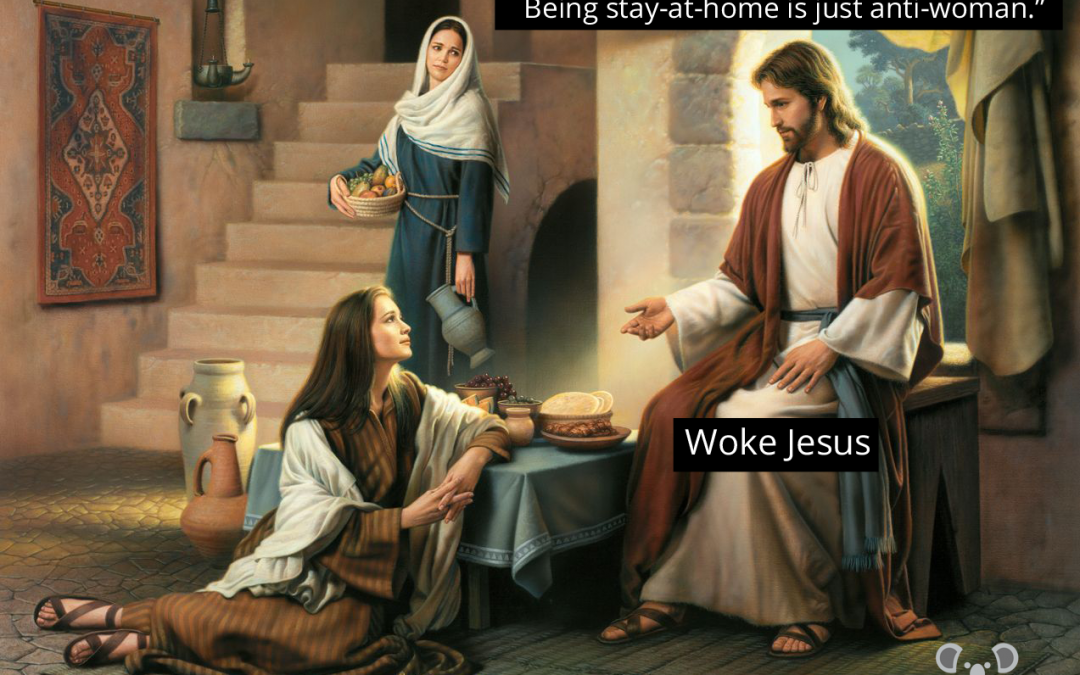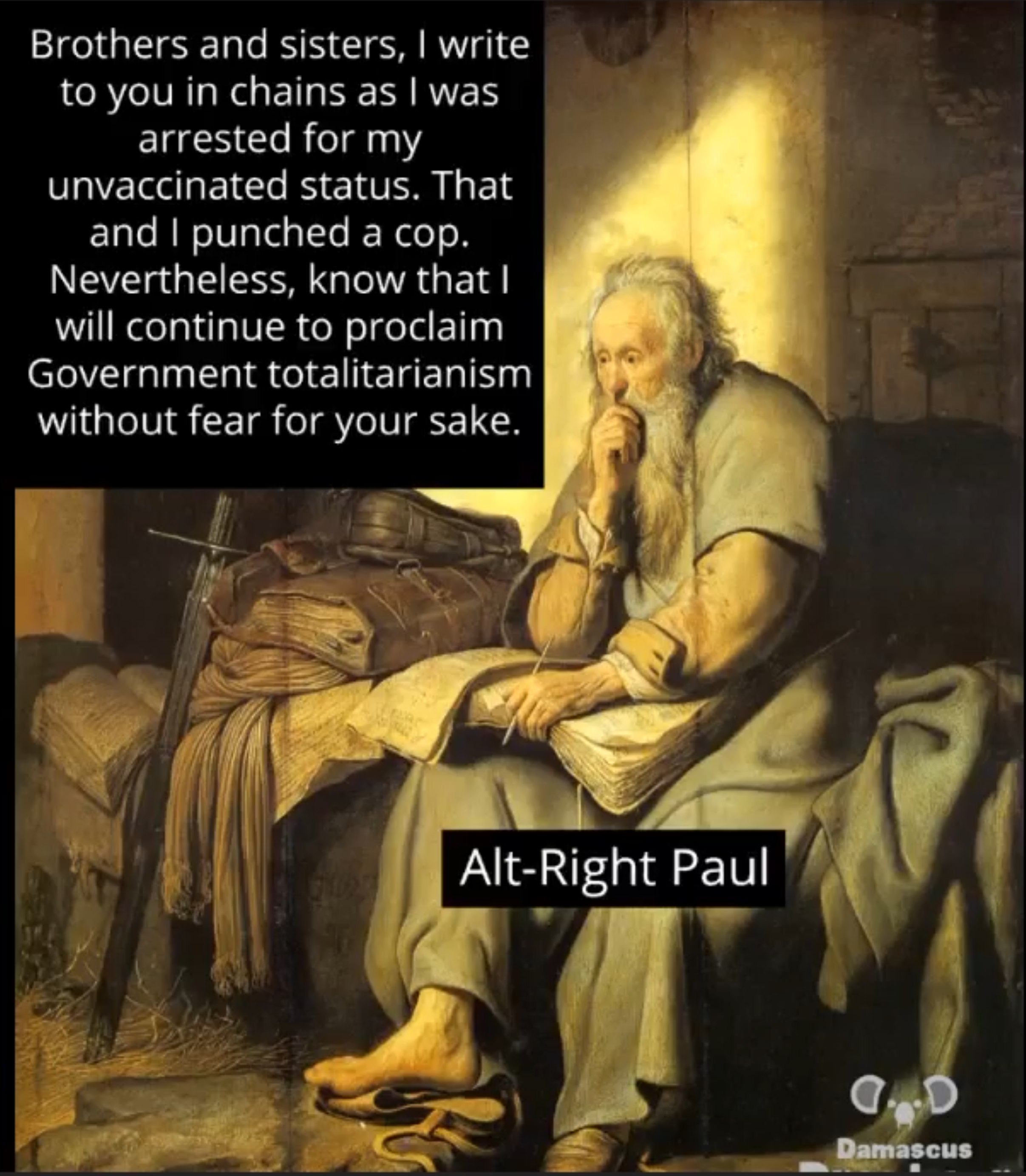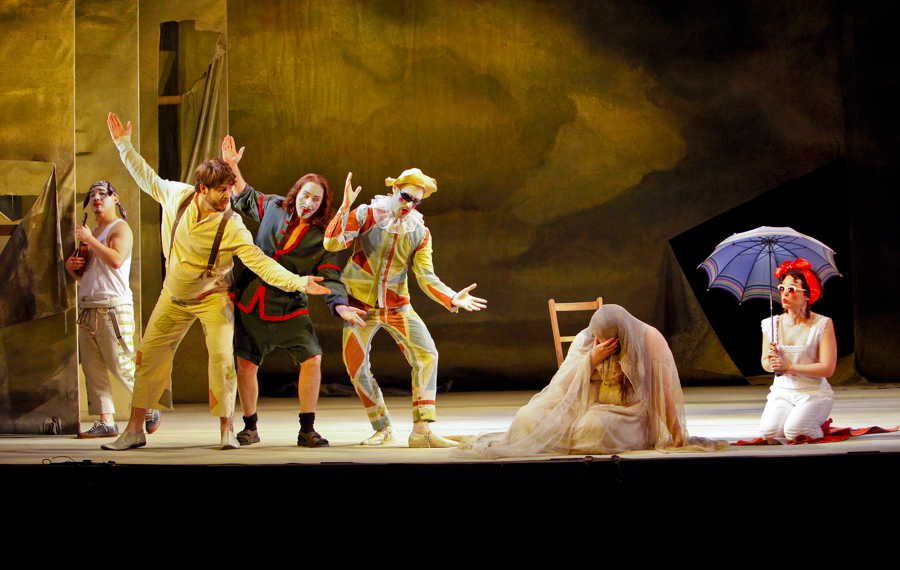Episode 57: Fake News, Satire and Poisonous Bears
A Christian satirist joins us for a conversation about faith, truth and fake news.
Sign up for Christian Civics Foundations
If you'If youd like to be invited to future events like this one, you should register for the next Christian Civics Foundations cohort today. It's a six-week discussion group covering the most fundamental ways Christians can think, speak and act differently in the public square. We cover things like a biblical attitude toward democracy, finding common ground with people you don't trust, and how and why to build a politically diverse spiritual community.
Shownotes
Links, videos and slides can be found throughout the episode transcript.
Rate, Review and Subscribe
Subscribe to The Christian Civics Podcast on Apple Podcasts, Google Podcasts, Spotify, or your favorite podcasting app!
Introduction
In our “101-level” courses, we focus on fostering the posture and skills that Christians need to become agents of healing in the health of our democracy.
Last week, we held the first in a new, ongoing series of “201-level” events, exploring some of the most pressing, urgent and specific questions that Christians face in American politics. The evening focused on how Christians can engage with satire and fake news. We welcomed a Christian satirist from Australia to talk about the goals of his work, the role of satire in the Bible, and how Christians can use humor to bridge major divides. The first half of the evening was a presentation from our guest, and the second half was a live interview and audience Q&A.
To kick off this season of the podcast, we’re gonna share the first half—the presentation half. We recorded it all via Zoom, so the audio might get a little choppy in some places. But you can find a full transcript, plus all of his visual aids, on our website, Christian Civics dot org. After the presentation, I’ll be back with a little follow-up.
Transcript
The term “fake news” was first popularized in the US in the mid-nineties by the now-late comedian Norm MacDonald, who would kick off his Weekend Update segments on Saturday Night Live by announcing that it was time “for the fake news.” According to MacDonald, he thought that introduction signaled for the audience that they were in for something absurd. He really reveled in the tension of calling news “fake,” since news was, to him, by definition, true.
Over the past few years, “fake news” has gone from a label used by humorous and satirists to a term academics and media critics used to describe viral or even deliberate misinformation to a term political figures use to try to discredit their detractors—and the lines between those three uses of the term aren't always clear. As a recent New York Times article about the Birds Aren't Real conspiracy pointed out, a lot of misinformation that people really believe clearly started out as examples of satire—the kind of fake news nor McDonald talked about, not the kind of fake news a defensive politician would talk about.
Tonight, we're going to welcome the director of the Damascus Dropbear to talk with us about his own experience creating fake news and what that experience has taught him about living out a Christian commitment to truth.
The Damascus Dropbear is an Australian ministry that describes itself as, “producing fake news for the faithful,” Christian satire that helps people laugh, then think about politics and culture from a biblical worldview. Their articles skewer both Christian culture (one of my personal favorite headlines from them reads, “Keyboard Missionaries Anointed to Argue with Atheists on Facebook”) as well as Australia's latest political hot potatoes.
This year, they introduced two new provocative characters: Woke Jesus and Alt-Right Paul, and you can follow the exploits of Woke Jesus and Alt-Right Paul on Instagram and Twitter. Before we welcome the director into talk a little bit about his work, I want to give you a couple of notes:
First, our guest tonight asked if he can keep his mask on, and we all agreed. We didn't think that was too big of an ask to put on us, given that he's crossing time and space and time zones to be with us.
Another note: He wanted me to make sure to mention that the humor in the Damascus Dropbear is aimed at an Australian audience, and we're separated from them by a common language. Even if we might understand the words on the page, sometimes the humor might not translate to American sensibilities or American frames of reference. He swears that if there's anything he talks about that you don't find funny, it's because you're an American, not because it's a bad joke.
And now without further ado, please join me in welcoming the director of the Damascus Dropbear.
Why Wear a Mask Over Zoom?
Damascus Dropbear: Hello everyone. Good evening to those in the United States. It's a pleasure to be here. Thank you to the Center for Christian Civics for having us here. I am the director of the Damascus Dropbear. And for those in the US, I've actually taken the liberty of flipping our screen upside down because, obviously, as Australians, we do Zoom the other way round.
I thought I'd start by talking about the mask. Why the mask? There are three reasons why.
First, there may have been some stories that you've seen in the United States about the “oppressive Australian regime” around lockdowns and [COVID] restrictions. With this new variants that we've had, they've now asked us all to wear masks, even over Zoom! That's how oppressive and restrictive the Australian government has become!
The second reason (and this one is actually true), is that, unfortunately, the directors of the Damascus Dropbear don’t have the support to do this full-time. We all have to have day jobs, and a number of our day jobs involve political engagement, being directly involved in politics. And unfortunately in Australia, debate is so divisive and toxic that we've had a number of cases where Christians in the public square have been individually targeted, or their employers targeted, or their families targeted. This is not an exaggeration. And so, having a little bit of a controversial ministry like this requires a slight separation, and we've been careful to keep our directors anonymous
Lastly, the reason we're doing this is, we do actually sell these masks. For those who can't read it properly, it says, “Don't wash your hands like Pilate.” This is what I like to call, “aggressive mask evangelism,” where you go out in public and people look at you in odd ways and eventually someone confronts you and you get to actually explain who Pilate is and what you're really trying to say.
What is the Damascus Dropbear?
The Damascus Dropbear started at the start of last year, right before the pandemic. We wanted to help people laugh and think about theology, culture, the church, and politics from a Biblical worldview. Our mission is to help people engage with the Bible and explore questions around religion in Australia and ultimately see Christian principles and ethics have a role in shaping the public debate.
In terms of the name, it's an interesting one.
The most obvious aspect is the road to Damascus, where the apostle Paul first saw the lights and saw Lord Jesus. We recognize that there is a journey that we're taking, and we want to have these revelation moments that take us deeper.
But we also thought about the situation of modern-day Damascus. The city of Damascus in Syria has been in the midst of a war zone for a long time now, and maybe that's an illustration of where we're at in regards to culture at the moment. It is a bit like a war zone. The question is, what we do with this war? Do we jump in and fight? Or are there more creative and redemptive opportunities to engage?
So that's the first half. The second half is the fascinating one.
The dropbear is actually what we talk about when a tourist comes to Australia. They'll talk about all the exciting things they're going to do around the country, and we always warn them, “You've got to be careful, because there's a lot of animals in Australia that are trying to kill you—snakes and crocodiles—but the one thing you've got to be really careful of is the dropbears.” They’re a cousin to the koala, except they are much more vicious. They sit up in trees. They've got big, long claws. They've got some venom. And they will literally just drop out of a tree on top of you if you're walking through the bush, You've gotta be really careful of them!”
Now, this is actually not true. It's the great Australian joke, simply to scare tourists. It's wonderfully funny for Australians. We think that's hilarious, that we made people more scared for some reason. A dropbear being part of the great Australian joke brings that depth to our name, saying that we are looking at humor and satire.
The Significance of Satire
This time last year, we had some horrible fires go through Australia. We were talking millions of hectares of land burnt up. Tens of millions of animals killed. It was a horrible time. Canberra, which is the capital of Australia, the whole city was covered in smoke for two weeks. We really couldn't go outside, it was that bad. It was a horrible time.
But then this video came up of a Scottish journalist who had come over to cover the bushfires and had obviously been sucked into this story about dropbears. They ended up making this video of her, where they dressed her up in full armor and said, “Would you like to hold the dropbear?”
And they dressed her up in his full armor—goggles and motocross armor—and gave her a koala, telling her it was a dropbear. And she was terrified! And, you know, koalas are really cute and cuddly, and right at the end of it, she realized she'd been had. All of the people around her were laughing, and she took the joke very well. But it was at a time of tragedy that satire, this joke, came. Humor actually has a role to play in tragedy.
When 9/11 happened all those years ago, the famous satire site The Onion–the first really big internet satire site—had this question of, “Do we do satire around 9/11?” Do we just completely not touch it at all? And they had a big discussion about this and eventually they decided, yes, we will do it. We'll do it carefully, but yes. And it was probably their most successful edition ever!
And I think that actually satire can bring laughter in the midst of traveling tragedy and plays an important role.
Why Christians Should Care About Satire
In Australia, if you look at the top 10 shared posts every day—Twitter releases the top 10 Australian shared and engaged with social media posts every single day—without exception, every single day, there is a satire site on there. A fake news story hitting the top 10 shared and engaged things in Australia. Now that's very significant, because it means that [satire] is one of the most powerful communication tools that there are in Australia. And so the obvious question would be, why would the church withdraw from it? To quote the famous line, “Why should the devil have all the good music?”
Most of the satire companies in Australia though, are, to be frank, quite vulgar, and quite ideologically driven. They attack individuals. For us, we see that and we see that actually these things are only increasing division.
So what does Christian satire look like? How do you love your neighbor as a satirist? How do you actually bring unity as a satirist?
GK Chesterton once said that humor can get in under the door while seriousness is still fumbling with the handle. We've got a theologian here in Australia called Michael Bird. He's he's one of our top thinkers. He's written, 20, 30 books. Incredible mind.
And he put this tweet up the other day that said, “I think we need a new Christian satire site, kind of like Babylon Bee, but without the pathological fixation on AOC.” I'm not trying to criticize the Babylon Bee. Obviously they were one of the inspirations for our work. But I find it really interesting that a top theologian is saying that we need good, Christian satire that's a little bit less ideological, a little bit less divisive. I think that is worth paying attention to.
Biblical Satire
I want to give you two examples of satire and discernment and Christian discipleship. The first one comes from the Bible. 1 Kings 22 tells a story of the prophet Micaiah during the time of King Ahab. If you remember, King Ahab was a very poor king of Israel, and he wanted to go to this war with the king of Gilead.
And so it goes to this ally, and he says, “Let's go to war. Come and join me. We'll go to war. We'll take back this land.” And the other guy says, “I reckon we should get some counsel from the LORD first. So Ahab says, “All right, we'll get some counsel.” And they get about 400 prophets.
And there's a mix of all sorts of prophets, all sorts of different gods. And every single one of them says, yes, go to war. This is what this god wants. All the gods want you to go to war! This is it!
But the ally of king says, “Hold on it. what about the LORD. What about the old god? No, one's giving a prophecy from him! Is there any of these prophets of the LORD?”
And Ahab goes, “Yes, there is. There's one. There's the prophet Micaiah. I hate him! He never says anything good, never prophesies anything good to me.”
So they go and find the prophet Micaiah, and the advisor comes along and strongly advises him before he goes in. He says, “Look, all the other prophets are saying to go to war. The king wants to go to war. We know this is what the right path is. I strongly advise you to speak in favor of going to war.”
And then he comes before Ahab, and King Ahab says, “Okay, Micaiah, should we go to war or not?”
And Micaiah says, “Yes! Attack and be victorious!” And King Ahab looks at him and goes, “Hold on. That doesn't sound right. No. You have to tell me the truth. You have to tell me what God is actually saying.” And then Micaiah goes, “Look, you're right. And in fact, the LORD has decreed disaster upon you. If you go to war, you're going to die. Your sheep are going to be scattered. That's what the prophecy is.”
And Ahab goes, “I knew it! See? He never says anything good about me! Anything at all!”
And one of the other prophets comes up and actually slaps the prophet. Micaiah. It’s a very vibrant scene! He slaps Micaiah for indicating that they were all wrong and he was right to decree disaster.
And so King Ahab have puts Micaiah in prison and he says, “Keep him in prison until I return,” and Micaiah says, “If you return, then the LORD didn't speak through me!” And that's the end of it. King Ahab goes off to war and dies. We never hear from the prophet Micaiah again.
The most fascinating part here is that Micaiah gives a fake news prophecy in the middle of the story. He tells Ahab the wrong thing. And why does he do this? He does it to help the king reflect.
Now, I lie to my kids all the time—but I only lie to them when they know. I might say to them, “Yes, there is a monster in your cupboard. His name's Gerald. I've been feeding him on the lunch scraps that you haven't been eating from school.” I lie to them! But why do I do it? I do it because it helps them use their discernment and reflect on what is being said—and even reflect on their own response. I mean, ideally! They might end up being terrified by Gerald the monster in their cupboard, but ideally they start to realize, hold on, actually, there isn't a monster. And if there is a monster, maybe it's not that scary. It forces them to think about it in the same way Micaiah is forcing King Ahab to reflect on what God is actually saying himself. King Ahab knows already what God's will is in this. He knows he's not meant to go to war. The prophet Micaiah needs Ahab to not just be told that, but to recognize that. He still goes against it, but you can see that satire and fake news can develop curiosity and draw people deeper into faith and into their response.
That's the first example I want to give you of why satire is significant and important and should be considered by Christians looking to engage in the public space.
Satire in Church History
One more story. This one’s about Martin Luther, from around the 1500s, at the time of the great Protestant Reformation. Here we get to see an example of how fake news and satire, when used well, can subtly challenge powerful idols in culture and in the church.
Luther is a fascinating case study because not only was he a brilliant theologian, but he was also in the time of the birth of the printing press, and he really was the first one to utilize mass communication. The Reformation could not have happened without the printing press.
Not only did Luther print out his pamphlets and theology, but he also printed out lots of humor. He loved humor and he loved insulting people. Look up “Luther insults” and it'll just come up with all these incredibly funny insults—far worse than the jokes we make.
One example is, he did a flip book. So this is a picture of the Pope at the time, who Luther did not like at all, for obvious reasons. For those who know Martin Luther, there's a critique of the Catholic church and the corruption and the power that he saw. And so there's a little flip book where you'll see on the side there, [a picture of the then-current Pope]. And then you flip it down. It's actually a gruesome demon!
Now, this would have been very shocking at the time—but also very funny to the masses who are starting to wrestle with these issues themselves. This is Luther's way of helping them.
In 1542, Luther actually anonymously published a pamphlet similar to what the Damascus Dropbear are doing today. We publish anonymously! It was called, “The New Pamphlet From the Rhine,” and it advertised sensational relics.
A bit of church history: Relics were things that many in the church would say, “If you come and touch this relic or pray over this relic, then you'll get time off purgatory. (And you give us money for that as well, it’ll be a fundraiser for the church.)” And Luther thought this was the worst thing ever. It was disrupting salvation. It was distorting faith. So he wrote this anonymous pamphlet about a new exhibition of relics, including:
Three flames from the burning Bush of Mount Sinai
Two feathers and an egg from the Holy Spirit
One half of the arch angel Gabriel’s wing
A whole pound of the wind that roared by Elijah in the cave of Mount Horeb
A large piece of the shouts with which the children of Israel tumbled the walls of Jericho
Five nice strings from the harp of David
Three beautiful locks of Absalom's hair, which got caught in the oak and left him hanging
You see what he’s doing here? He's using satire to raise really important points of theology and culture. And what he saw is false teaching in the church. Fake news and satire can suddenly challenge powerful narratives and cultural idols, and it pushes people. After they laugh, they start thinking they reflect on what they believe and why.
Creative Approaches to Breaking Down Divides
I want to go into my last section here and just talk about creative approaches to breaking down divides and some of our work in fake news stories. Here are some examples of some of the ones we do: “Bezos now seeking to be first rich man to ride camel through eye of a needle.” “Zuckerberg announces launch your first ever virtual reality Meta-church.” This is one of our Olympic ones: “Christian athletes yet to win an Olympic medal after repeatedly allowing others to finish first.”



Can you see a little bit of what we're doing and why? We're actually stirring up interesting discussions about what church is meant to be. Would an online reality church work? Even a Zoom church? What would work and wouldn't work. What it means to be a Christian competitor. How competitive should Christians be?
So obviously you can look at this and you can laugh at the meme and then you can move on. But some people want to go deeper on Facebook, and so we’ll have the whole fake news story attached, which you can read and work through, and there's all of the little jokes which make subtle and points and explore the story or the issue at hand.
If you want to go even deeper, we've got biblical verses and references to biblical verses scattered through. And then finally at the end we always post an article which encourages people who want to read a bit more about the question. It allows them to do that further reading.
Now we think that this is a creative approach to breaking down divides because, firstly, we mock both sides of politics. We mock the church and outside the church. But we do it in a way to help people laugh and think. We think that humor is an important way of taking the sting out of issues. Some of these issues—I would say vaccinations, for example—people feel very strongly about. But by joking about vaccinations, now I'll get on both sides of the debate. You actually help people to be maybe a bit less defensive. And when you help people be a bit less defensive, it helps break down those barriers and helps them think about these issues a little bit more from a safer spot. We're trying to hold the Bible in one hand and the newspaper—or at least the funny pages of the newspaper—in the other hand. Drawing out not only these interesting discussions, but also what the Bible might have to say to these issues that we face every day and get confronted by in the news and on social media.
One of the key messages that we have in joking about politics is that salvation doesn't come from politics. We have this tendency today to deify or demonize in politics. But for Christians, we're seeking to transcend it. That's not where salvation comes from. That's not what our hope is in. And once you realize that again, I think you're able to read and discern and engage in ways that are much more productive, much less divisive.
Woke Jesus and Alt-Right Paul
Rick also mentioned at the start about these two characters we've developed. I’ll start with Woke Jesus. This is quite a confronting one for some people. Woke Jesus is this image of Jesus who strolls around and gives these really progressive statements to people. So in this one, yo instead of your sins are forgiven the scene of the man coming through the roof, love Jesus for giving his white privilege. And here we have Jesus telling Mary that actually she should be more like Martha and get a full-time job instead of just sitting at his feet. That’s a commentary on the feminist movement and some of the challenges against being a stay at home mum or being family focused.


For some people, this is quite shocking. Some may find it hilarious. Other people have said they hated it. I was accused of blasphemy for being part of this. But we also have people who love this stuff because they think that ANY image of Jesus is actually blasphemous, so they welcome the mocking of it.
Now this went really well, and so we decided that we needed to be balanced. And so we created the new character, which is Alt-Right Paul. Now it's the same thing. Christians often get sucked into not just left ideologies, but we get sucked into right-wing ideologies as well.
Alt-Right Paul is what people might want Paul to be on the right. He got arrested for his unvaccinated status. That's why he's in prison—plus he punched a cop (which has happened here in Australia with the protests going on). Nevertheless he will proclaim government totalitarianism without fear for your sake.


The idea of this is to help us understand and be challenged by thinking, “Hold on. This is not what they said. This is not who they are.” Literally the way that we come up with these is, we'll read a passage of scripture and then we'll flip it and try and say the opposite of what it's saying. Not to mock scripture—We love the Bible! We want people to read the Bible!—but to help people to go, “Hold on, what does the Bible actually say? What does Paul say? What does Jesus actually say? And is this what he would actually do?”
I want to finish with an encouragement to think differently about how we engage. This is our attempt, I don't know whether we've been successful or not in the reach and engagement we want to have, but there's certainly been some pathway through and some surprising connections. We've had atheist comedians we've made jokes about, who then come and engage with us in really productive ways on satire. It's been wonderful. But think about how we transcend the game, how we transcend media, how we transcend politics. This is really what we're trying to do.
The Comedy of Redemption
And I want to read you a last story and observation from a Catholic theologian called William Cavanaugh. He wrote an article called “From One City to Two” where he explores St. Augustin’s concept of the city of man and city of God.
At the end of the article, Cavanaugh tells us this story about an opera by Richard Strauss called Ariadne auf Naxos:
The action is set in the house of the richest man in Vienna, who is busy throwing a feast for numerous guests. The host is a man of indiscriminate taste. He has scheduled dinner to be followed by two performances, one a tragic opera […] based on the Ariadne legend, and the other a comedy featuring harlequins, nymphs, and buffoons. The pompous composer of the opera is outraged when he discovers that his masterwork is to be followed by such a frivolous offering. The situation becomes much worse for the composer and his Prima Donna when the Major Domo—on orders from his Lordship, the master of the house— announces that, in order to leave time for the fireworks display, both the tragedy and the comedy will have to be performed simultaneously, on the same stage.
The composer objects to the other actors infiltrating his tragedy, as Ariadne on Naxos “is the symbol of Mankind in Solitude.” The Major Domo, however, explains that his Lordship has watched the rehearsals and “has been greatly displeased that in a mansion so magnificently equipped as his, a scene so poverty-struck as a Desert Island should be set before him.” He wants to enliven the tragedy with characters from the comedy. And so Zerbinetta and her troupe of comedians prepare to bring light to the Ariadne story. Zerbinetta, says the Dancing Master, is “a past mistress of improvisation. As she always plays herself, you see, she is always at home in scenes of every kind.”
As the curtain rises on the second act of Strauss’ opera, Ariadne is at the grotto grieving her abandonment by her lover Theseus. Ariadne resolves to await Hermes, the messenger of death, to take her away to the underworld, the realm of death, for in death is peace and the cessation of suffering and corruption. However, Zerbinetta and her troupe of comedians interrupt Ariadne’s tragedy and alter the direction of the opera. Zerbinetta tries to convince Ariadne that she wants not death, but a new lover. On the scene comes the rakish young god Bacchus, whom Ariadne at first mistakes for the messenger of death. Eventually, how- ever, she is won by his wooing, and she embraces life instead of death, as he carries her off to the heavens.
The reason Cavanaugh tells this story is that,
For Augustine … the stage is the world on which the one drama of salvation history is being enacted. The earthly city and the city of God are two intermingled performances, one a tragedy, the other a comedy. There are not two sets of props, no division of goods between spiritual and temporal, infinite and finite. Both cities are concerned with the same questions: What is the purpose of human life? How should human life be ordered to achieve that purpose? The difference is that the city of God tells the story that we believe to be true…
…and tells it, I guess we could describe it, as the comedy of redemption.
I wanted to finish with that story to get you thinking about how we engage in the public space. We're on the same stage, using the same props, but we have very different ends. The comedy of redemption is actually what we're trying to bring.






